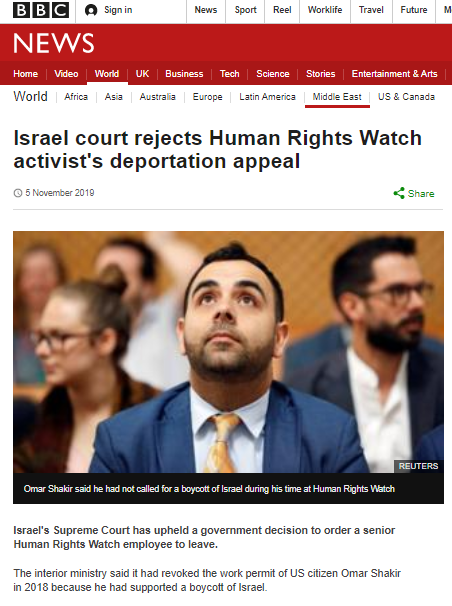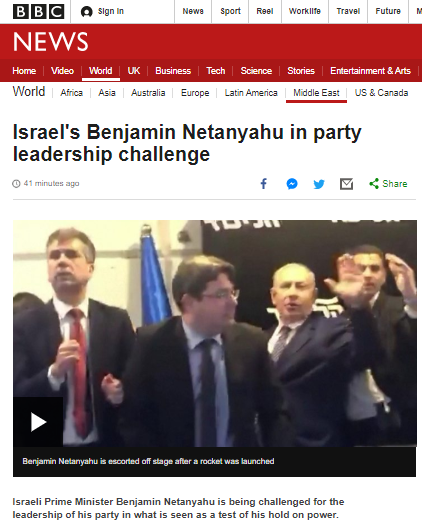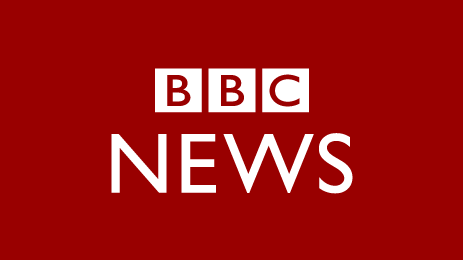On the afternoon of November 5th the BBC News website published a report on its ‘Middle East’ page which was presented to audiences with a ‘halo effect’ reference to a “rights activist”.

The report itself (tagged, inter alia, ‘human rights’) is headlined “Israel court rejects Human Rights Watch activist’s deportation appeal” and the caption under the photograph at the top of the article reads:
“Omar Shakir said he had not called for a boycott of Israel during his time at Human Rights Watch”
Obviously the BBC did not fact-check that claim from the person it had already flagged up as a “rights activist” (i.e. good) before amplifying it.
Had it done so, it would know that analysis of Tweets sent from Shakir’s personal Twitter account between June 2018 and February 2019 by NGO Monitor shows that 16% of those Tweets focused on BDS campaigns against Booking.com and TripAdvisor and additional Tweets supported a UN “blacklist” of businesses operating in Judea & Samaria.
45% of the BBC article’s word count is devoted to uncritical amplification of talking points from Omar Shakir (including a link to a Tweet) and his employer ‘Human Rights Watch’, including the following claim:
“The group [HRW] insists that neither it nor Mr Shakir promote boycotts of Israel.”
That claim was also seen in a May 2018 BBC report on the same case and as we noted at the time:
“Obviously too, the BBC has ‘forgotten’ that an anti-Israel campaign at FIFA (which it vigorously promoted at the time) was supported by political NGOs including Human Rights Watch. In fact, Shakir even went so far as to fly to Bahrain a year ago to lobby FIFA officials and – as Professor Gerald Steinberg recently noted:
“In the past year alone, HRW pushed divestment from Israeli banks, targeted Israel’s membership in FIFA (the international soccer association), called for arms embargoes and ending security cooperation, lobbied the UN to “blacklist” companies doing business in Israel, and petitioned the International Criminal Court to open prosecutions against Israeli officials.””
32% of the BBC report’s word count describes the position of Israel’s interior ministry. As usual the BBC abstains from providing its audiences with an explanation of the BDS campaign in its own words.
“The interior ministry argued that Mr Shakir was an “activist” for the Boycott, Divestment and Sanctions (BDS) movement, which campaigns for a complete boycott of Israel over its policies towards the Palestinians.
Israel says that BDS opposes the country’s very existence and is motivated by anti-Semitism. In 2017, it passed a law refusing entry to people with links to BDS.”
The body of the report includes links to three items of additional reading:

The first of those items promotes the falsehood that the BDS campaign solely relates to a “cultural boycott” of Israel. The second is remarkable for its lack of fact checking and the third (from 2015) uncritically amplifies falsehoods promoted by a professional BDS campaigner, including about the campaign’s origins.
Readers also find the BBC’s standard partisan portrayal of ‘international law’.
“The settlements are considered illegal under international law, though Israel disputes this.”
The report’s final paragraph is devoted to amplification of the support of third parties for Shakir, including unnamed organisations portrayed as “human rights groups” which actually include political NGOs such as ‘Breaking the Silence’.
“Former Israeli officials and human rights groups filed motions to join Mr Shakir’s appeal, while the European Union and United Nations Secretary General António Guterres called on Israel not to deport him.”
Remarkably though, the BBC’s report makes no attempt to provide readers with details of the Supreme Court decision. As NGO Monitor documents:
“The Court firmly rejected a key argument from Shakir’s lawyers. They tried to argue that Shakir’s personal BDS activity ended upon his employment at HRW, at which point all his expressions should be attributed to HRW as an organization. Since HRW is not on the Israeli government’s list of “BDS organizations,” Shakir’s activity as an HRW employee should be granted “immunity” from the Entry into Israel Law. In sharp contradiction, the Court determined that he is responsible for his public statements, especially those on his private Twitter account.”
For years ‘Human Rights Watch’ has been one of the political NGOs most quoted and promoted by the BBC in its coverage of Israel and yet that organisation’s political agenda has never been adequately clarified to audiences as demanded by BBC editorial guidelines on impartiality. Since Omar Shakir’s work permit was not renewed in May 2018 BBC audiences have seen only superficial coverage which, like this latest report, clearly demonstrates that the BBC has no interest whatsoever in providing its audiences with the full range of information necessary for proper understanding of the story and its wider BDS campaign related background.
Related Articles:
BBC News website amplifies the NGO echo-chamber
BBC’s Bateman shoehorns anti-Israel NGO into hi-tech story
BBC amplified anti-Israel campaign rejected by FIFA
BBC WS news bulletins amplify HRW delegitimisation campaign
BBC News claims BDS is solely about ‘a cultural boycott’
BBC News uses ‘Israel says’ instead of fact checking
More BBC mainstreaming of the anti-Israel BDS campaign – part one
BBC News report on Airbnb backtrack follows usual recipe




